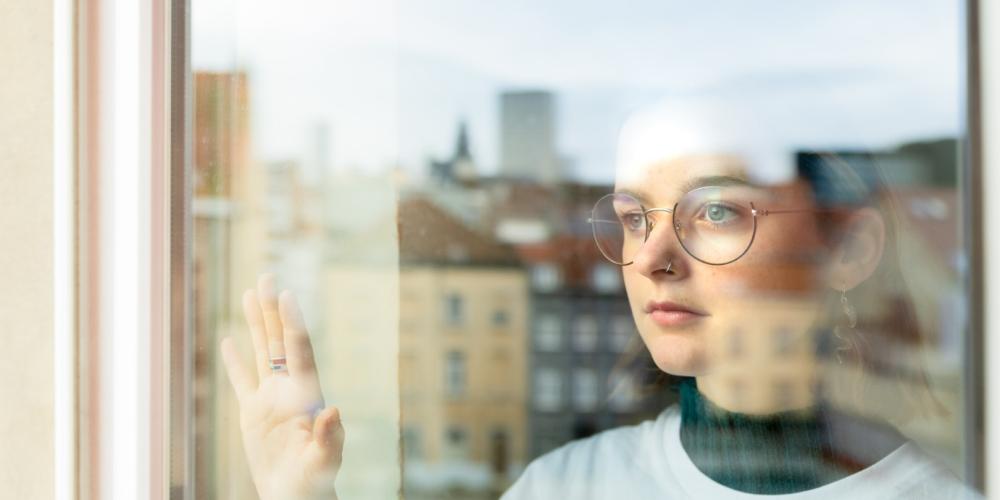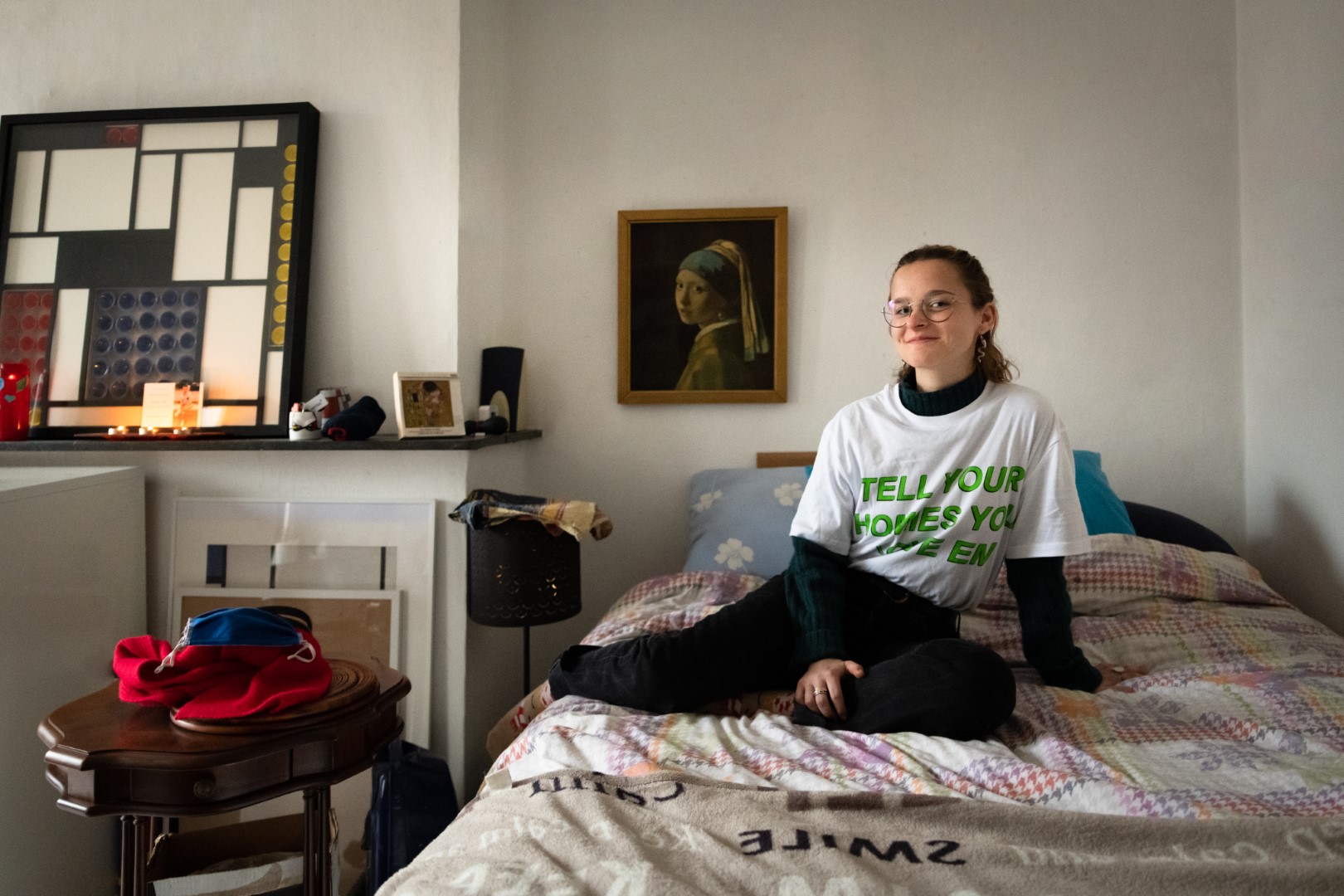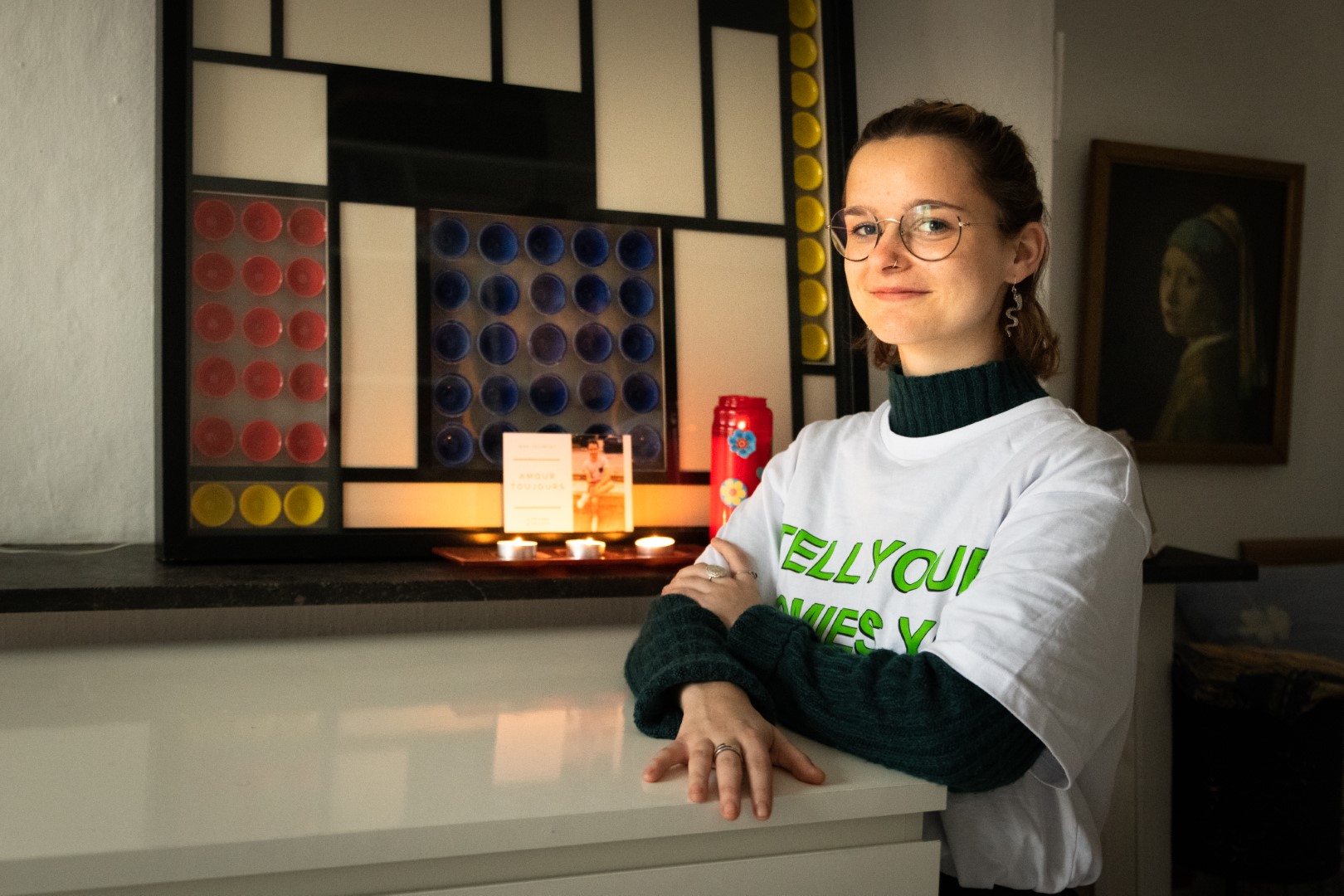
At the start of September, Montana Tachelet received terrible news: her brother Ingo had taken his own life in his dorm. Ingo, just like Montana, was a bachelor student at VUB. “Of course, his death hit me very hard, and so did how little we know about each other’s mental health. That’s why I want to create awareness of it.” A conversation with a brave student, in the week in which VUB holds both a moment of remembrance and a commemoration of its founder.
Montana should have been giving a speech on Thursday during the moment of remembrance at the Monument of Compassion. The monument was unveiled last year in response to the signing of a declaration that made VUB the first ‘compassionate university’ in Europe. But corona has put a stop to that.
“The speech would have been for my brother. I would have compared his death to the fall of Icarus. As a student of art and archaeology, I am interested in myths and sagas. I know, Icarus didn’t want to kill himself. But like my brother, he jumped. It’s a way of translating a horrible thing into a scene that everyone knows, that somehow makes it less horrible. Icarus flew too close to the sun, and my brother came too close to his urge to be gone. I thought that was a suitable image,” says Montana.
Connection is important, also with the university
The fact she was going to give the speech means she was in contact with VUB. And this connection was there very early on. “It was a psychologist who called me with the bad news,” says Montana. “I was informed very quickly, as my brother killed himself at VUB. The psychologist also followed up with me for a while, and that gave me a good feeling, this connection between the university and myself, especially in the early days. But I must say, it wasn’t for that long, it could have been longer.”
 'Mondrian', Vermeer and Montana
'Mondrian', Vermeer and Montana
Now Montana finds her support mainly among her friends. “I think you should be able to turn to your friends,” she says. “But that is something different from realising that you need professional help. It would be logical, particularly for first-year students, for VUB to introduce the psychologists and say: look, these are the people, they will be there when you need them. That way you remove the unfamiliarity with the team, which makes it easier to approach them.” (Note: if you want to contact a student psychologist, you can always send an e-mail. A response will be given as soon as possible).
She continues: “I understand that it’s not always easy to keep supporting students. Universities are huge. The situation would be the same at other universities. But for students it’s important to know that a team is there.”
Does she know of fellow students who are also struggling, who would welcome VUB reaching out a hand to them? “Yes. And especially now, with the pandemic. I am sure there are people who want to talk. It doesn’t have to be with a psychologist; a guidance counsellor would also be good. But that can take three weeks or so. Plus there is the uncertainty over what you can talk about: only study-related things, or can you go deeper?”
Montana, understandably, doesn’t find it easy. “I have difficulty concentrating and following online lectures anyway. The grief process makes it even harder. But like other students, I keep doing my best and try to succeed.”
 Montana Tachelet in her Brussels student room
Montana Tachelet in her Brussels student room
The power of a simple message
And so we arrive at the message that she wants to share with her fellow students. “It’s important that students know it’s sometimes hard, but that we are all in this together and can be there for each other. Sending a simple ‘hey, how’s it going?’ to a friend can make a big difference. Or just calling someone. And the other way round: if you don’t feel right yourself, then say something. That’s completely ok. It’s strange that there’s such a taboo around this. I think you would be amazed how many people, just like you, sometimes don’t feel right, but are afraid to let you know. As if there was a wall around us. On the other hand: it doesn’t always have to be about mental health. It also helps if you let people know when you’re feeling good. That makes your friends feel good, and that’s worthwhile.”
Is she someone who is quick to let people know if she’s done something fun? “I must admit that my friends used to only hear from me when I was going through a hard time. Until a friend told me that it was tiring for him. He knew that I sometimes felt good, and he wanted to see more of my fun side. And so now I send more of those sometimes banal messages, asking him right away how things are with him, with my friends. Because that’s also important: that they feel they can call you with their problems.”
Wake-up call
It’s remarkable how deeply Montana is concerned with mental wellbeing and resilience. Has that always been the case, or does it come directly from the tragedy she has experienced? “I’ve always believed there should be more done around mental health,” she says. “I have always supported that. But I never thought that I would be so personally involved in it. So what happened to my brother definitely flicked a switch. What’s also striking is that helping other people has really helped with the grieving process. It energises me. So I want to give a wake-up call: mental health is really important, so come on people, let’s help each other more. I’m trying to spread this message as much as possible. That’s why I’m so happy that I have friends who are spreading the same message. It feels safe to know that there are lots of people doing the same.”
If you are thinking about suicide and you need a conversation, you can contact the Suicide Line (Zelfmoordlijn) at 1813 or via www.zelfmoord1813.be. You can also chat on www.tele-onthaal.be; you can call them on number 106.